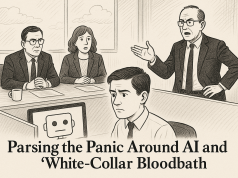In every workplace, there exists an intangible yet potent landscape—a realm where power ebbs and flows through the corridors, and office politics shape the narrative of the day. However, this aspect of work life often remains shrouded in mystery, an undercurrent of forces that are felt but seldom discussed openly. At The Work Times, we believe it’s crucial to shed light on these invisible dynamics that affect every aspect of organizational life. In this article, we will explore the psychological underpinnings of power and politics in the workplace, and how they manifest in relationships and decision-making processes.
We’ll begin by examining the concept of power negotiation. Power within an organization is not a fixed entity; it’s a currency that is traded, earned, and lost. Employees at all levels engage in subtle negotiations of power, whether they are aware of it or not. We will look at case studies that highlight how negotiation of power can be done effectively, and how individuals can assert their presence in a competitive environment without resorting to overt aggression or political gamesmanship.
Next, we’ll delve into the role of influence and persuasion in leadership. The ability to sway opinions and direct outcomes is a hallmark of effective leadership. However, it’s a practice that walks a fine line between manipulation and inspiration. We’ll analyze the techniques leaders use to influence their teams, and how these strategies can either uplift or erode the integrity of a team. By drawing insights from organizational psychology, we aim to uncover the markers of positive influence and provide guidance on how to inspire others while fostering a culture of trust.
But what happens when political maneuvering takes center stage? The impact of politics on employee morale and productivity can be profound. When the workplace becomes a political battlefield, the casualties are often the trust and collaboration that are essential for success. We will discuss the consequences of such maneuvering and share narratives from within organizations that have faced the challenge of overcoming toxic political environments.
Finally, we present strategies for individuals and teams to navigate the unseen dynamics of workplace power and politics. From maintaining professional integrity to building coalitions of support, we will provide actionable advice for those looking to understand the ‘game’ and succeed without sacrificing their values.
The aim of this deep dive into the psychological currents of workplace dynamics is not to deter you, but to empower you. With this knowledge, we hope to arm our readers with the insight needed to chart a course through the complexities of organizational life. The Work Times is committed to fostering transparent and equitable work environments, where power is used to elevate and politics to unite rather than divide. Join us in this exploration and become an adept navigator of the unseen forces that shape your work world.




























